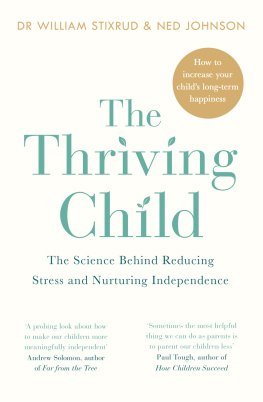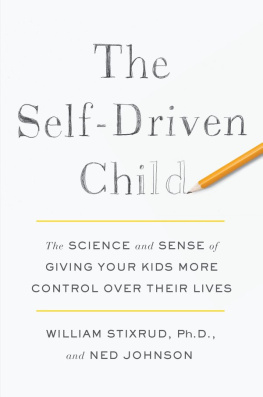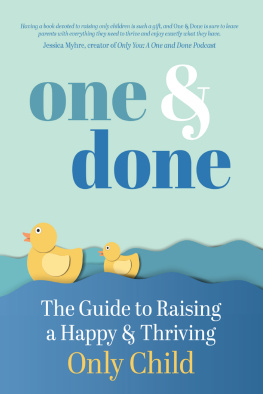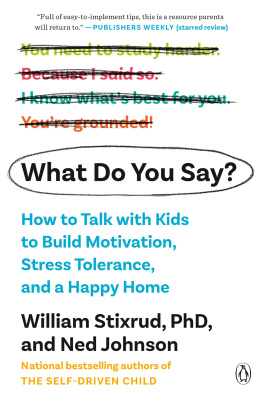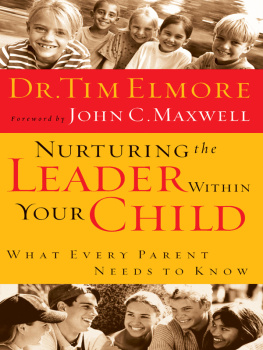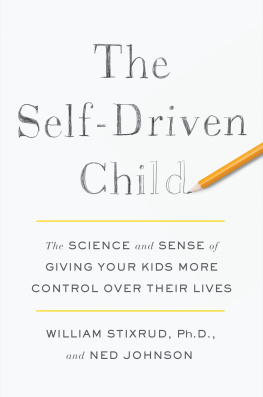William Stixrud - The thriving child : the science behind reducing stress and nurturing independence
Here you can read online William Stixrud - The thriving child : the science behind reducing stress and nurturing independence full text of the book (entire story) in english for free. Download pdf and epub, get meaning, cover and reviews about this ebook. year: 2018, genre: Children. Description of the work, (preface) as well as reviews are available. Best literature library LitArk.com created for fans of good reading and offers a wide selection of genres:
Romance novel
Science fiction
Adventure
Detective
Science
History
Home and family
Prose
Art
Politics
Computer
Non-fiction
Religion
Business
Children
Humor
Choose a favorite category and find really read worthwhile books. Enjoy immersion in the world of imagination, feel the emotions of the characters or learn something new for yourself, make an fascinating discovery.
- Book:The thriving child : the science behind reducing stress and nurturing independence
- Author:
- Genre:
- Year:2018
- Rating:3 / 5
- Favourites:Add to favourites
- Your mark:
- 60
- 1
- 2
- 3
- 4
- 5
The thriving child : the science behind reducing stress and nurturing independence: summary, description and annotation
We offer to read an annotation, description, summary or preface (depends on what the author of the book "The thriving child : the science behind reducing stress and nurturing independence" wrote himself). If you haven't found the necessary information about the book — write in the comments, we will try to find it.
William Stixrud: author's other books
Who wrote The thriving child : the science behind reducing stress and nurturing independence? Find out the surname, the name of the author of the book and a list of all author's works by series.
The thriving child : the science behind reducing stress and nurturing independence — read online for free the complete book (whole text) full work
Below is the text of the book, divided by pages. System saving the place of the last page read, allows you to conveniently read the book "The thriving child : the science behind reducing stress and nurturing independence" online for free, without having to search again every time where you left off. Put a bookmark, and you can go to the page where you finished reading at any time.
Font size:
Interval:
Bookmark:
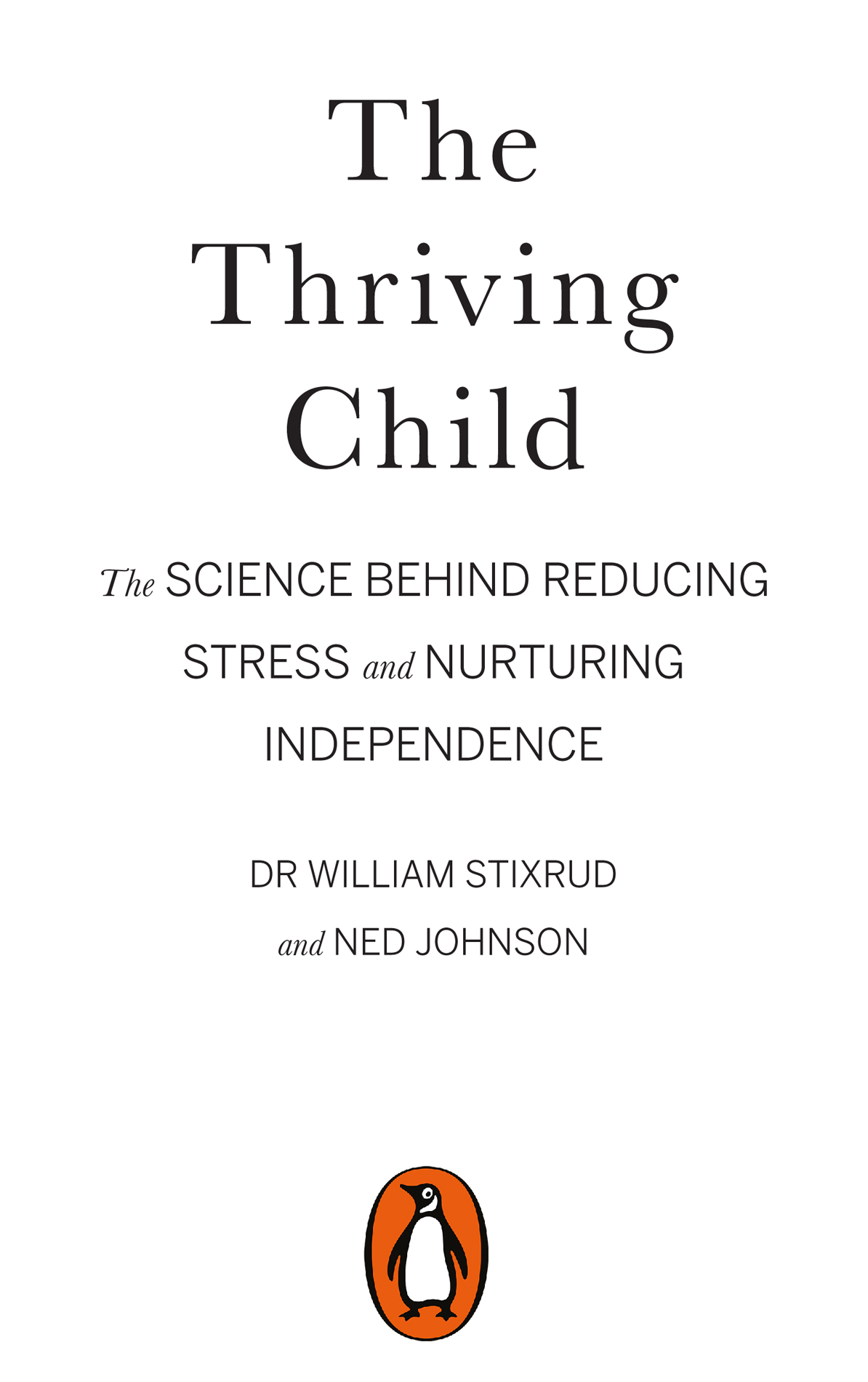
UK | USA | Canada | Ireland | Australia
India | New Zealand | South Africa
Penguin Life is part of the Penguin Random House group of companies whose addresses can be found at global.penguinrandomhouse.com.

First published in the United States of America as The Self-Driven Child by Viking 2018
First published in Great Britain as The Thriving Child by Penguin Life 2018
Copyright William Stixrud and Ned Johnson, 2018
The moral right of the author has been asserted
Illustrations by John D. Fair
ISBN: 978-0-241-29812-1
To my parents, who adopted me, were crazy about me, and let me learn to run my own life.
W. S.
To my beloved Vanessa, who kindled in me a passion for helping children.
To Katie and Matthew: I am endlessly grateful for having the greatest kids in the world.
N. J.
The stories in this book are all real. They are the stories of the children, parents, and educators we have worked with over the years. Helping and being helped, teaching and learning, requires trust and often invites great vulnerability. We are deeply grateful for the trust and faith so many children and their families have shown us, and we have, in some cases, altered names or certain identifying details to protect their privacy.
At first blush, we are not obvious partners. Bill is a nationally recognized clinical neuropsychologist who has been helping kids cope with anxiety, learning disabilities, and behavioral problems for thirty years. People often remark on his calm temperament, most likely a result of the decades he has spent practicing Transcendental Meditation. Ned founded PrepMatters, one of the most successful tutoring companies in the country. Hes an energetic Gen Xer, raising young teens, whose students often say he has the enthusiasm of three people.
We met a few years ago as guest speakers at the same event. When we started talking, we discovered something interesting. Despite our differing backgrounds, disciplines, and client bases, we were trying to help kids overcome similar problems in surprisingly complementary ways. Bill approaches them from the perspective of brain development; Ned through the art and science of performance. As we talked, we found our knowledge and experiences fit together like a jigsaw puzzle. And while Neds client might struggle with the panic that she might not get into Stanford, and Bills might struggle to get to school at all, we each begin with the same baseline questions: How can we help this kid gain a sense of control over his life? How can we help him find his own inner drive and make the most of his potential?
we thought we were onto something important. This impression was confirmed when we started to probe deeper and found that a healthy sense of control is related to virtually everything we want for our children, including physical and mental health, academic success, and happiness.
From 1960 until 2002, high school and college students have steadily reported lower and lower levels of internal locus of control (the belief that they can control their own destiny) and higher levels of external locus of control (the belief that their destiny is determined by external forces). This change has been associated with an increased vulnerability to anxiety and depression. In fact, adolescents and young adults today are five to eight times more likely to experience the symptoms of an anxiety disorder than young people were at earlier times, including during the Great Depression, World War II, and the cold war. Are things really harder now than they were during the Depression? Or are we doing something that is dampening their natural coping mechanisms?
Without a healthy sense of control, kids feel powerless and overwhelmed and will often become passive or resigned. When they are denied the ability to make meaningful choices, they are at high risk of becoming anxious, struggling to manage anger, becoming self-destructive, or self-medicating. Despite the many resources and opportunities their parents offer them, they will often fail to thrive. Without a sense of control, regardless of their background, inner turmoil will take its toll.
It is also why the kid who decides on his own to do his homework (or not) will be happier, less stressed, and ultimately more capable of navigating life.
We want our kids to be able to participate in a competitive global economy, to be relevant, to feel they can hack it. We love them and want them to be happy and to thrive long after were gone. All worthy goals. But to achieve them, many of us have bought into some false assumptions:
False Assumption 1: There is a narrow path to success and God forbid our child should fall off it. The stakes are thus too high to let them make decisions for themselves. This argument hinges on an assumption of scarcity, one that says that for young people to be successful, they must be competitive at all timeswhatever the price.
False Assumption 2: It is critical to do well in school if you want to do well in life. There will be some winners and many losers. It is Yale or McDonalds. As a result, too many kids are either driven manically or have given up trying.
False Assumption 3: Pushing more will lead our children to becoming more accomplished and more successful adults. Our sixth graders arent scoring as well as sixth graders in China? Okay, lets teach them ninth grade math. College admission is getting tougher than ever? Yikes, lets pack our kids schedules so theyll learn and do more.
False Assumption 4: The world is more dangerous than ever before. We have to supervise our kids constantly to make sure they dont get hurt or make bad decisions.
Now many parents instinctively understand that these assumptions are untrue (and we will spend some time in this book debunking them). But that perspective dissipates when they feel pressuredby peers, by schools, or by other parentsto ensure their child isnt falling behind. The pressure is rooted deeply in fear, and fear almost always leads to bad decisions.
We really cant control our kidsand doing so shouldnt be our goal. Our role is to teach them to think and act independently, so that they will have the judgment to succeed in school and, most important, in life. Rather than pushing them to do things they resist, we should seek to help them find things they love and develop their inner motivation. Our aim is to move away from a model that depends on parental pressure to one that nurtures a childs own drive. That is what we mean by the thriving child.
We start with the assumption that kids have brains in their heads and want their lives to work and that, with some support, theyll figure out what to do. They know its important to get up in the morning and get dressed. They know its important to do their homework. They feel the pressure even if they dont show it, and if they are struggling, nagging them about it will only reinforce their resistance. The trick is to give them enough freedom and respect to let them figure things out for themselves. Even if it were possible to control our kids and mold them into who or what we want them to be, we might be less stressed, but they would be more controlled than self-controlled.
We will talk in this book about important research in neuroscience and developmental psychology and will share our experiences from our combined sixty years working with kids. We hope to convince you that you should think of yourself as a consultant to your kids rather than their boss or manager. We will try to persuade you of the wisdom of saying Its your call as often as possible. Well offer ideas to help you help your kids find their own internal motivation, and well coach you in navigating an educational system that is often at odds with giving kids autonomy. We will help you move in the direction of being a nonanxious presence, which is one of the best things you can do for your kids, your family, and yourself. At the end of each chapter, we will give you actionable steps to put into effect immediately.
Font size:
Interval:
Bookmark:
Similar books «The thriving child : the science behind reducing stress and nurturing independence»
Look at similar books to The thriving child : the science behind reducing stress and nurturing independence. We have selected literature similar in name and meaning in the hope of providing readers with more options to find new, interesting, not yet read works.
Discussion, reviews of the book The thriving child : the science behind reducing stress and nurturing independence and just readers' own opinions. Leave your comments, write what you think about the work, its meaning or the main characters. Specify what exactly you liked and what you didn't like, and why you think so.

